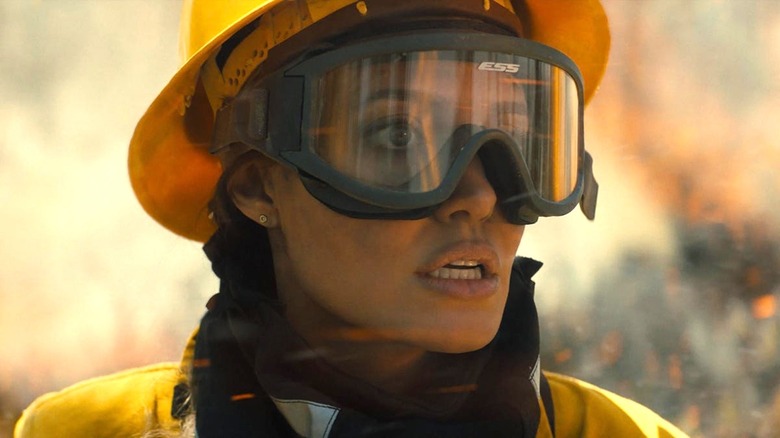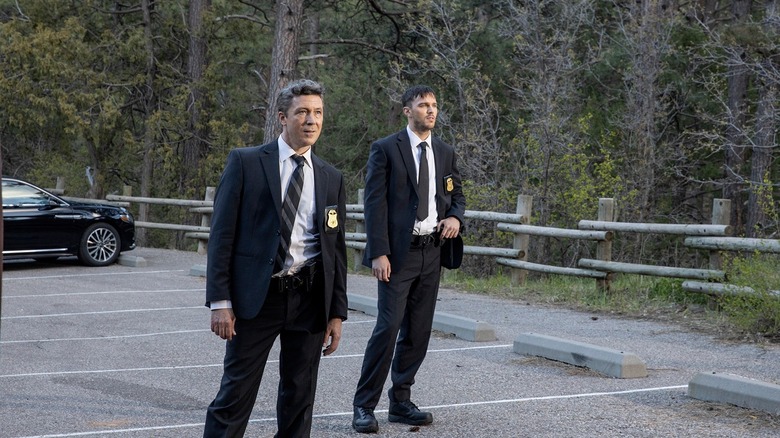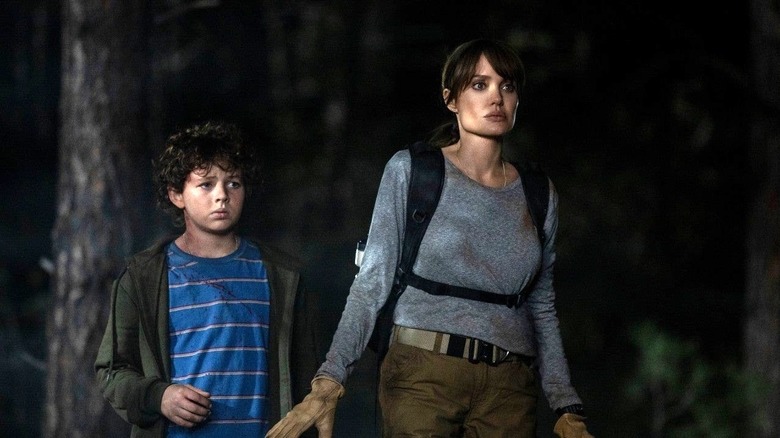Those Who Wish Me Dead Review: Smoke From A Distant Fire
Out of nowhere, Taylor Sheridan immediately became one of Hollywood's most in-demand screenwriters. After years toiling away as a character actor, his best known part being a recurring role in the early seasons of "Sons of Anarchy," in the mid-2010s he sold two screenplays in quick succession — the nihilistic, slyly satirical thriller "Sicario" and the elegiac crime drama "Hell or High Water." Although different in tone, they both helped to create the impression of Sheridan as an important voice in cinema; his first screenplay offering a scathing view of U.S. foreign policy, his second tapping into the anxieties of a "forgotten America" in the same year as Donald Trump's election. They made him an A-list screenwriter, showing he could blend populist genre thrills with enough ideas to satisfy highbrow audiences, playing equally well to the smartest and the dumbest person in the room. Five years removed from "Hell or High Water," and he's yet to build on the promise of either of those early screenplays.
"Those Who Wish Me Dead," Sheridan's second film as director, keenly exposes his flaws as a writer. Whereas he made his name with two crime films with loftier ideas, now he just wants to immediately skip to the action; a case of widespread political corruption is the inciting incident for this violent drama, and yet the specifics of this are never expanded upon, let alone explored. I was left with the sense that the only thing he was attracted to from the source material (the 2014 novel of the same name by Michael Koryta, who has co-written this adaptation) was the central cat and mouse hunt, his desire to play around with western tropes overshadowing the need to add depth to the story. As a stripped-down, nuts-and-bolts thriller, the film is Sheridan's most enjoyable project in quite some time. But when compared to his earliest screenplays, it can't help but feel phoned in — a film with all the action, but none of the ideas, of his best work.
Breathing life into an undercooked screenplay
Angelina Jolie stars as Hannah, a smoke jumper still haunted by nightmares of a recent forest blaze in which she failed to save the lives of three children. But as a forest fire threatens to engulf the area surrounding her watchtower, a shot at redemption presents itself. Connor (Finn Little) is a child on the run after his dad was killed by two hitmen (Nicholas Hoult and Aidan Gillen), due to possessing details of a political corruption case the powers that be don't want to get out. They've left a pile of bodies in their wake, but Connor has managed to escape — and now, deep in the forest, he meets Hannah, who aims to help him flee to safety. Meanwhile, the hitmen have tracked down Connor's uncle, the cop Ethan (Jon Bernthal), and threaten the life of his pregnant wife in order to get him to lead them to Connor, insisting he be the one to pull the trigger.
The film's standout performances come courtesy of Aidan Gillen and Nicholas Hoult as the menacing father and son contract killers. Sheridan is often so economically minded with his characterization that central roles can appear underwritten, but here, he makes their lack of backstory work to his advantage. Their moral detachment from the wider world around them makes them all the more threatening, with both actors rising up to the challenge of breathing life into what otherwise could be stock villains. As we get deeper into the third act and we discover the limitations of their clear consciences, refusing to kill children or pregnant women but more than happy to watch other people do the job, they become more fascinating.
Up until that point, they command attention through sheer attitude alone, understanding that when the screenplay doesn't offer a wealth of character motivation, detachment is how to make a thin sketch of a character feel like a substantial threat. At this point, Aidan Gillen can play a villainous role like this in his sleep, but the against-type casting of Hoult turns out to be a surprisingly effective compliment; in their earliest scenes together, it often feels like a bizarro world buddy cop drama, a grizzled mentor teaching the tricks of the trade to a new recruit. Only in this case, one of those tricks is changing a shirt with a minuscule speck of blood to escape suspicion after killing a family and setting fire to their house.
A surface level thrill ride
On the other side of the narrative is an increasingly rare performance from Angelina Jolie, who is now more often found behind the camera rather than in front of it. She's afforded the character with the most substantial backstory, albeit one that doesn't hold the dramatic weight within the film that it should on paper — it doesn't help that she's introduced as a free-spirited firefighter, quick with sharp comebacks to lecherous co-workers and fast to take part in daredevil stunts that show off her smoke jumper abilities. The story tries to sell her as a woman wracked with guilt over a failed mission, who has lapsed into alcoholism as a result. Sheridan only offers brief glimpses of this, more content with creating a conventional action vehicle for his movie star heroine, stripping down any excess characterization to brief flashbacks. Jolie breathes life into the material she's been given, but the screenplay never lets you feel the weight of the wounds that have supposedly drastically altered her life. It's not an afterthought, but it is undercooked, and deeper detail could have helped amplify the stakes of an already tense second half even further.
Sheridan's main attraction to the source material seems to be its many western tropes, which he's distilled down to their purest essence in this adaptation. But this is far from the first time he's played around in that sandbox, and in earlier works (most notably, the aforementioned "Hell or High Water") twinned his classical storytelling with something to say about modern, divided America in the wake of the 2008 financial crash. Here, there's no cultural commentary beyond an offhand gag at the expense of an extra seen vaping, with nothing to say about the country's political landscape either — something which is almost impressive, considering that a political corruption case is the cause for much of the film's high body count. Of course, this may be asking for a film Sheridan had no desire to make, but as it stands, "Those Who Wish Me Dead" is a film with a lot of bite, but nothing to actually chew on.
As a pure genre exercise, "Those Who Wish Me Dead" is Taylor Sheridan's most enjoyable work in years. It just once again pales in comparison next to the gritty political commentary of his earlier films.


